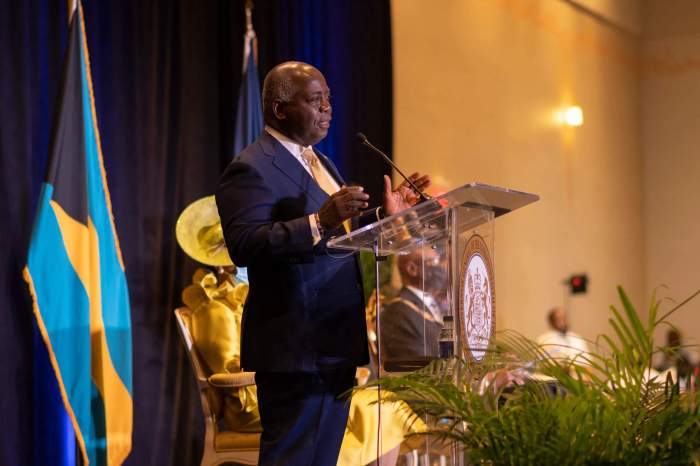Caribbean
Japan has allocated US$5 million to help rural women in Guyana and Dominica, particularly those working in agriculture, withstand the effect of climate change.
The money will fund a project to strengthen disaster management capacity of women in the two countries, which will be implemented over a three-year period starting in April.
It will be administered by the United Nation’s Development Program (UNDP).
The agriculture sector in Guyana and Dominica has been increasingly affected by climate change and recurring disasters such as hurricanes, floods and droughts. Dominica has been the hardest hit countries by the devastating hurricanes in 2017. And Guyana has seen floods and droughts particularly in hinterland regions that have disrupted the livelihoods of many families.
According to the UNDP, disaster risk reduction is more critical in building resilience or rural communities and the active role of women in agriculture points to the need to strengthen capacities and systems to empower women in disaster management.
Barbados
Continuous training is essential for frontline personnel who are most likely to come into contact with the victims of human trafficking.
This is the view of Barbados Attorney General Adriel Brathwaite while addressing a two-day regional conference on efforts to combat human trafficking in the Caribbean.
The conference was facilitated by the Washington-based global advisory and specialist strategy firm, Warnath Group and sponsored by the United States Embassy in Barbados.
It was attended by criminal justice officials and ministry personnel from Barbados and St. Vincent and the Grenadines.
Brathwaite said it as necessary for there to be information sharing among the various stakeholders and with delegates underscoring the need for a collaborative approach, primarily focused on sensitization about the issue and the steps being taken to eradicate.
Bahamas’s former Under Secretary in the Ministry of National Security and chairman of that country’s Trafficking in Persons Committee, Karen Rigby, expressed concern about human trafficking in the region stating that the “insidious and vexing crime” was “taking root” in the Caribbean at the domestic and international levels.
Bahamas
The Bahamas government has approved Oban Energies to start an oil refinery and oil storage facility in Grand Bahamas.
This was revealed by Prime Minister Dr. Hubert Minnis who said the project is expected to create 600 direct jobs, 1,000 indirect jobs during construction.
Estimated cost of the project is overUS$4 billion.
The prime minister said his government has recently completed negotiating the Heads of Agreement which paves the way for the commencement of this important project.
Dr. Minnis said the heads of agreement will be signed shortly and that in the coming weeks, two additional heads of agreements will be signed.
He said the Oban Energy Management team has been involved in large energy infrastructure projects around the world and brings over 30 years of large, complex constructing experience
The prime minister further advised that the first phase of the project will consist for four million barrels of fuel storage, a harbor and deep sea loading docks to service large vessels and the construction of 50,000 barrels per day refinery.
Jamaica
Jamaica has signed a framework agreement with China to invest up to US$6 billion to develop an industrial park and a special economic zone in Jamaica.
Executive vice-governor of Gansu Province in China, Huang Qiang, said Beijing is prepared to pump money into the facility alongside China’s state-owned Jiuquan Iron & Steel Group (JISCO) ALPART operations in Nain, St. Elizabeth, Jamaica.
JISCO paid US$299 million to acquire ALPART, a modern vertically-integrated production complex that includes bauxite mines and an alumina refinery and spend more than US$60 million to facilitate its re-opening last year.
A government statement noted that the announcement by Qiang came at the signing of Framework Agreement and follows closely on the heels on a Non-Binding Agreement of Intent last September between Jamaica’s Transport and Mining Minister, Lester Henry and the Governor of Gansu Province, Tang Renjian in China.
Prime Minister Andrew Holness said that the size of the investment for this contemplated development is of major significance for both Jamaica and China, in that it is the largest investment ever contemplated in Jamaica and its first overseas investment for Gansu Province,
St. Lucia
St. Lucia recorded its highest performance in tourism arrivals during 2017, with total visitor arrival climbing to more than 1 million.
This is according to figures released by the Caribbean Tourism Organization (CTO) which revealed that the island also recorded the highest growth in 2017 among the CTO members’ countries, registering an 11 percent increase.
In 2017 stay-over arrivals was put at 386,127 and the cruise ship sector recording a 14 percent increase, reaching 669, 217, an additional 81,264 visitors despite the eight-month closure of the point Seraphine Berth 1.
Commenting on the figures, Minister of Tourism Information and Broadcasting Dominic Fedee, said the tourism industry continues to be incredibly important and vital part of the St. Lucian economy.
St. Vincent
Key stakeholders involved in the Organization of Eastern Caribbean States (OECS) network for tourism and hospitality training and education project recently met in St Vincent and the Grenadines.
The two-day meeting which was held in Kingstown brought together representatives of the OECS Commission, members of the Eastern Caribbean Institute of Tourism (ECIT) Implementation Task Force and project consultants.
The purpose of the meeting was to provide member states with an update on the ECIT implementation Task Force to get their input in formulating a sustainability strategy for ECIT.
In April 2010, the OECS Council Members of Tourism agreed to the development of an integrated system for hospitality training and education in the region.
The Council of Ministers mandated the OECS Commission to establish a network of excellence for tourism and hospitality training and education.
Trinidad
The Financial Intelligence Unit (FIU) in Trinidad and Tobago has reported over TT$22 billion in suspected proceeds of criminal conduct last year.
The FIU’s 2017 report said this unprecedented monetary value came from 877 suspicious transaction reports / suspicious activity reports (STR/SAR) which the FIU received last year.
FIU Director Susan Francois said the 877 STRs/SARs, 94 percent were completed suspicious transactions with a monetary value of TT$8.4 million while six percent were attempted transactions with a monetary value of over TT$13.6 billion.
She said 112 were related to suspected financing of terrorism offences, which represented an increase of 62 percent from 2016.
Francois said that to date, the FIU TT’s intelligence revealed 251 citizens of T&T suspected of being involved in the financing of terrorism and related offences.
– Compiled by Azad Ali


















